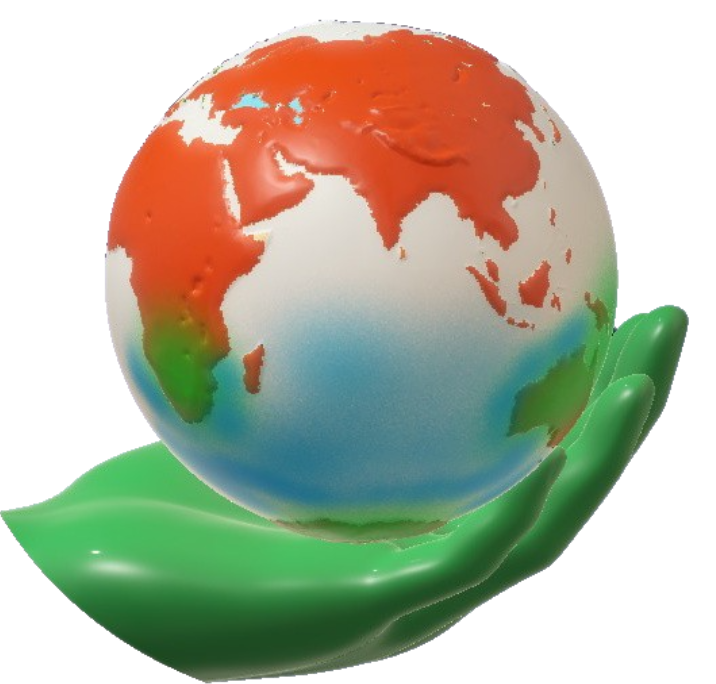Sreenivasulu.M.R the Great Plastic Artist of India
Sreenivasulu.M.R from Bangalore, India has shared his latest miniature monument to promote tourism and motivate people on 3R – Reduce, Reuse and Recycle of plastic materials. It is ‘Jaipur’s Hawa Mahal’ – It took him 15 months to cut over 900 pen refills into 13,246 pieces to recreate a monument built in the year 1799.

In the last 15 years he has reused over 9400 pen refills to make 11 miniatures and spent over 10,000 hours on educational sessions and collecting pen refills from various sources to construct his projects such as Eiffel Tower, Charminar, Big-Ben Clock, Taj Mahal, Leaning Tower of Pisa, Gateway of India, Seattle Space Needle, Sydney Harbour Bridge, St. Philomena Church, Amritsar Golden Temple and Jaipur Hawa Mahal. These were exhibited in various state level and national level events such as Indian Science Congress to educate people on plastic pollution.

As part of the ‘Say No to Plastic‘ program, which he organizes for awareness on sustainable living and global warming in schools and colleges, he set up used pen refill collection boxes available for students to dispose of their used pen refills. The program turned out to be a further source for raw materials to make Miniature structures. Early in the journey, Sreenivasulu realized that pen refills are one of the ignored forms of plastic in the world that may not even be included in the plastic recycling process.
As most users of pens are students, Sreenivasulu see tremendous merit in appropriately educating them on the importance of handling plastic waste and encouraging them to practice the 3R principle – Reduce, Reuse and Recycle which is his guiding principle. Through miniature art, Sreenivasulu is promoting sustainable living, art, culture and tourism of the monument. During miniature construction, Sreenivasulu does not use any machinery and involves a lot of passion, patience and research.

His art works have grabbed various records and awards to the nation like, RHR Republic (UK) World Record, GRRF Global Record and GRRF Asia Pacific Icon, URF Global Award, Unique World Record, International Book of Records, Elite World Records, etc.
You can join him for making next miniature by contributing used pens and be conscious on plastic materials. The art work has made an entry into finalists round for Lexus Design Awards India(LDAI) 2022 and virtual award ceremony is scheduled on Feb 10, 2022.
Two arrested with 1878 turtles in UP
Nearly 1,878 endangered turtles have been seized and two men of Kashmiri origin arrested in the Chakeri area of the city by the Special Task Force’s (STF) Kanpur unit.

The men had stuffed the turtles in sacks, they had concealed the same in a truck along with a consignment of sunmica and they wanted to take the turtles to West Bengal, when they were arrested.
According to the STF spokesman, the two arrested men belong to Kathua area of Jammu & Kashmir and have been identified as Javed and Farukh.
“They confessed that they both are truck drivers and were heading towards West Bengal from Rajasthan with the consignment of sunmica. In the middle of the journey, one Kapoor, a notorious smuggler of Etawah, had contacted them and asked them to transport sacks of turtles to West Bengal in lieu of Rs 60,000. Kapoor had been apprehended earlier also on several occasions,” stated the official STF release.
👉 Canindia
E-fasting can minimise e-waste
Electronic (e-waste) is emerging as a serious public health and environmental issue globally in this century. Annually, computer devices account for nearly 70% of e-waste; 12% comes from the telecom sector, 8% from medical equipment and 7% from electric equipment.

The lifecycle of electronic equipment should be understood to get a better understanding of what causes e-waste to be generated and its harmful nature. Obsolete devices are replaced by new devices due to the advent of new technologies, which, in turn, results in electronic waste.
India is the ‘fifth-largest electronic waste producer in the world’. Approximately 1.2 million tonnes of e-waste is generated annually in India according to the Central Pollution Control Board (CPCB). The government, public sector companies and private sector companies, generate nearly 75% of electronic waste, with the contribution of individual households being only 16%. Unorganised processing and recycling of e-waste is also not safe from the environmental point of view.
A digital fasting or e-fasting is usually referred to as reducing technology use — such as turning off notifications, turning our phone off while working and setting limits for the amount of time we spend on technology on a daily basis can not only be helpful for us but also minimise e-waste. Most important step would perhaps be raising awareness among every individual about the cause and effects of e-waste and request cooperation in the disposal of the same. Manufacturers are equally suggested to produce greener electronics.
👉 DTE
Chhattisgarh: Leopard skin seized in Dhamtari, 3 held
Three persons were arrested allegedly with a leopard skin in Chhattisgarh’s Dhamtari district, police said on Monday.

Acting on a tip off, the three accused were intercepted near Dongadula village on Dhamtari-Nagri road when they were looking for customers to sell the skin, an official said.
Those held were identified as Budhram (45), Banshi Lal Markam (45), both residents of Shobha area in neighbouring Gariaband district, and Dhansai Netam (34) from Sihawa area of Dhamtari district, he said.
How plant-based brands are making their products work for Indian consumers
If supermarket aisles and Instagram are to be believed, tofu is back. Not that it really ever went anywhere, but a rise in new brands focusing on plant-based products has returned the spotlight to soy and other non-animal protein sources.

In recent years, several companies have brought out their own versions of tofu, tempeh, jackfruit and other vegan products to specifically target a younger, healthier Indian audience that falls in line with a global interest in plant-based diets.

About a decade ago, you would hardly find vegan-anything,” said Vijay Pandey, co-founder of Health on Plants, which sells a range of plant-based products. However, in the last three or four years, a shift in the market has brought a bevy of new products. “If we could deliver food that could nourish vegetarians, we felt that’s where the biggest opportunity lies,” Siddharth Ramasubramanian, the founder and CEO of Vegolution, which makes Hello Tempayy, said.
👉 TNM

